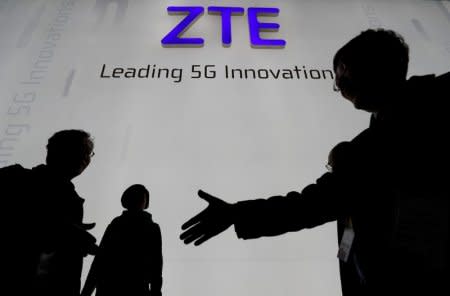U.S. lawmakers say they will try to block possible ZTE deal with China

Thomson Reuters
By David Lawder and Richard Cowan
WASHINGTON (Reuters) - U.S. lawmakers said on Tuesday they would try to stop President Donald Trump from easing penalties on Chinese telecommunications company ZTE Corp <000063.SZ>, saying the United States should not bow to pressure from Beijing to help the troubled firm as part of a possible trade deal.
The reaction from Capitol Hill could complicate the Trump administration's efforts to narrow a $335 billion annual trade gap with China, as Republicans and Democrats accused the president of bending to pressure from Beijing to ease up on a company that has admitted to violating sanctions on Iran.
"The proposed solution is like a wet noodle," said Senate Democratic Leader Chuck Schumer. Schumer accused Trump of putting national security at risk for minor trade concessions and said possible remedies floated by the Trump administration, such as changes to the company's board of directors, were inadequate.
According to sources familiar with the discussions, the proposed deal would lift a seven-year ban that prevents U.S. chipmakers and other companies from selling components to ZTE, which makes smartphones and telecommunications networking gear.
In return, China would eliminate tariffs on U.S. agriculture or agree to buy more farm products from the United States.
The U.S. Commerce Department imposed the ban in April after it determined that ZTE had broken an agreement after it pleaded guilty to shipping U.S. goods and technology to Iran.
The ban has threatened the viability of China's second-largest telecoms maker by cutting off access to companies that supply 25 to 30 percent of its components. Suppliers include some of the biggest U.S. tech companies, including Alphabet Inc's Google, which licenses its Android operating system to ZTE, and chipmaker Qualcomm Inc .
ZTE last week said that it had suspended its main operations.
The U.S. Department of Defense has also stopped selling ZTE's mobile phones and modems in stores on its military bases, citing potential security risks.
U.S. Treasury Secretary Steven Mnuchin told lawmakers that the treatment of ZTE was not "a quid pro quo or anything else" related to trade and said national security concerns would be taken into consideration.
"I can assure you that whatever changes or decisions that are made in Commerce will deal with the national security issues," Mnuchin told a U.S. Senate appropriations subcommittee.
Republican and Democratic lawmakers said they were looking at ways they could block any possible changes. "We will begin working on veto-proof congressional action," Republican Senator Marco Rubio said on Twitter.
Lawmakers are considering several possible options and aim to act "soon," said Dick Durbin, the Senate's No. 2 Democrat.
The Republican-controlled House of Representatives is weighing several possible changes to a defense-policy bill that would also keep up the pressure on ZTE. One proposal would block the sale of ZTE products and those of another Chinese company, Huawei, until national security officials certify they are safe.
Another proposal would require the director of national intelligence to consider the security implications of any changes to the ZTE ban, while a third would require reports on quid pro quo offers between the U.S. and Chinese governments over any possible plan.
Shares of ZTE's major U.S. suppliers, which would be able to restart sales to ZTE if the Commerce Department’s ban on U.S. exports is lifted, rose after the news overnight.
Optical component makers Acacia Communications shares led the pack with a 4.6 percent rise, and shares of Oclaro Inc shares were up 1.7 percent. Acacia received 30 percent of its total revenue in 2017 from ZTE and Oclaro received 18 percent from ZTE.
(Additional reporting by Susan Heavey, Doina Chiacu and Diane Bartz; writing by Andy Sullivan; editing by Chris Sanders and Jonathan Oatis)
See Also:

 Yahoo News
Yahoo News 
